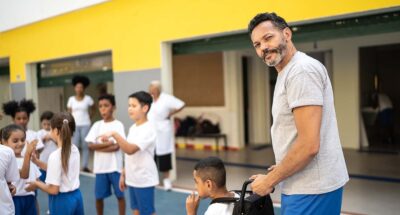

Module Introduction
In this module we will…
- Explore the concepts of equity, self-awareness, and emotional resilience as they relate to our work in schools
- Identify strategies to address burnout in education
Module Resources
This toolkit includes additional resources, including classroom lessons and practices, staff meeting activities, videos, podcasts, articles, and professional development opportunities, as well as supporting materials for group facilitation.
Individual Exploration
Let’s watch and discuss an interview with author and coach, Elena Aguilar, who reflects on educator resilience, the relationship between emotions and equity work, and the importance of these two words: “and” and “maybe.”
Emotions and Equity
Review the following video resources in this conversation between Elena Aguilar and Amy L. Eva, PhD, Associate Education Director, Greater Good Science Center:
Equity, Self-Awareness, and Emotional Resilience
Responding to Stress, Exhaustion, and Burnout: A New Vision for Education
Learning to Tell “Maybe” Stories
Practices for Emotional Resilience
Reflection
- When you think about the importance of educational equity and the role you play in creating a more equitable district, school, or classroom, what kinds of emotions arise for you?
- How would you describe your role when it comes to creating a more equitable district, school, or classroom?
Elena Aguilar says, “There’s just no way that we can do the work around equity without attending to our emotions and without cultivating the emotions that will help us to navigate the discomfort—because we are going to feel really uncomfortable.”
- How do you navigate uncomfortable emotions (others and your own) when you engage in important conversations about race and equity in schools? In what ways might those uncomfortable feelings inhibit you from speaking up about social injustice and racism?
- What are the ways oppressive, white-dominant social norms, patriarchal, and/or capitalist patterns and language influence our work as educators as it relates to the importance of emotions to learning, self-care, and advocating for our own well-being?
- In what ways might the words “control, manage, and regulate” (frequently used in our work around emotions and behavior) be contributing to oppressive practices? With the goals of agency and liberation in mind, what language could be used instead?
- What “and” and “maybe” stories can we tell about this moment in time as educators?
1.5 Take It Deeper: Self-Awareness, Emotional Resilience, and Equity
How can we create a culture of equity, self-awareness, and emotional resilience in our schools? Let’s start by visualizing it. Here is a downloadable guide to help you.
Module Resources
This toolkit includes additional resources, including classroom lessons and practices, staff meeting activities, videos, podcasts, articles, and professional learning opportunities, as well as supporting materials for group facilitation on the topic of "Caring for Ourselves: The Science of Emotional Resilience".
A reflection activity to help you create a culture of equity, self-awareness, and emotional resilience in your school.
Group Facilitation
Before facilitating groups, spend time in individual exploration in order to experience and embody the learning. And if you haven’t yet explored our introduction to SEL in California, make sure you explore those resources.
When facilitating groups, use the following resources:
This toolkit includes additional resources, including classroom lessons and practices, staff meeting activities, videos, podcasts, articles, and professional development opportunities, as well as supporting materials for group facilitation on the topic of "Caring for Ourselves: The Science of Emotional Resilience".
A revisable, turnkey powerpoint slide deck to use for professional learning sessions on the topic of "Caring for Ourselves: The Science of Emotional Resilience".
A powerpoint slide deck with welcoming and closing activities to include in professional learning sessions.
A reflection activity to help you create a culture of equity, self-awareness, and emotional resilience in your school.
Additional Modules
Caring for Ourselves: The Science of Emotional Resilience

Are you ready to build a kinder, happier school where everyone belongs? Join Greater Good Educators! Explore the science of well-being in a supportive community of educators from around the world. Registration is now open for the 2025-2026 school year!


Comments